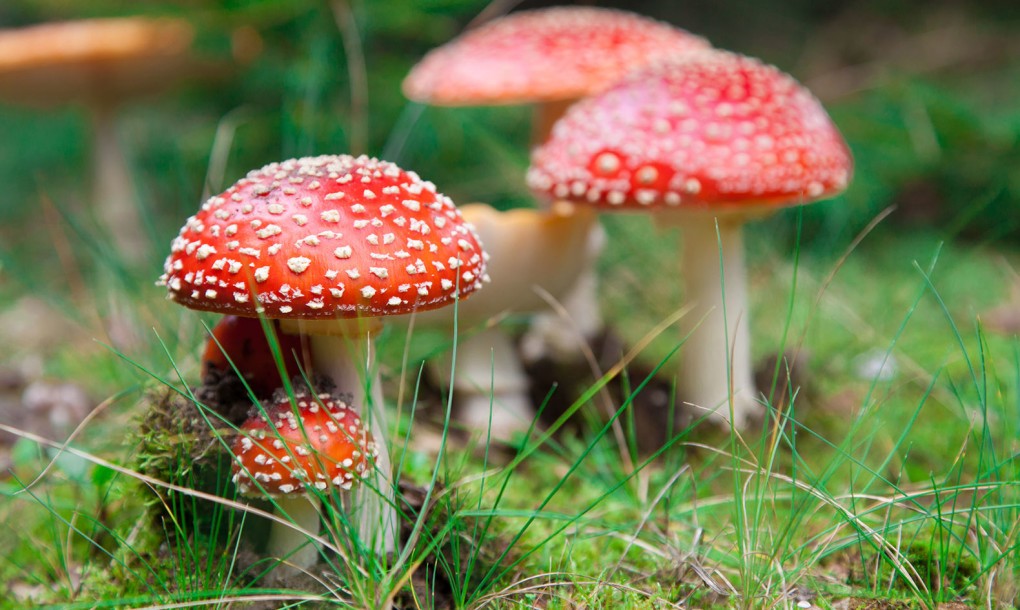
Advertisement
Mushrooms come in all shapes and sizes. They also come in different colors, sprout in different environments and have different uses. For example, the reishi mushroom, sometimes simply called ganoderma, is an herbal medicine. The Ancient Chinese used this fungus to treat insomnia, poor appetite and indigestion. Today, it is made into coffee to boost immunity, fight fatigue and improve memory, among other benefits.
Another example are the cordyceps mushrooms, a group of parasitic fungi that grow on the larvae of insects. These fungi are famously known for hijacking their hosts’ bodies and replacing host tissue with their own. Like ganoderma, cordyceps mushrooms were once used by the Ancient Chinese to treat fatigue and kidney disease. Today, they are sold in powder form in health food stores, promising to boost energy and improve athletic performance. Powdered cordyceps can be conveniently added to soups and stews or made into tea or broth.
And then, there are the magic mushrooms. Perhaps best-known for their recreational use, these wild or cultivated mushrooms produce a psychoactive and hallucinogenic compound known as psilocybin. Because of psilocybin’s nature as a psychedelic and its high potential for misuse, magic mushrooms have been at the center of controversy for decades.
But magic mushrooms, also fondly called “shrooms,” have been proving themselves to be more than just hallucinogens in clinical trials. In fact, because of the promising results their active compound yields, the U.S. Food and Drug Administration has declared psilocybin therapy a “breakthrough therapy” not just once, but twice, in recent years.
According to the latest studies, magic mushrooms have the potential to treat a severe type of depression that resists all conventional treatments for the disorder. And researchers say the impressive effects of magic mushrooms are all thanks to psilocybin’s ability to “reboot” the brain of people with major depressive disorder.
Magic mushrooms: Mood-lifting fungi?
Scientists have been studying psilocybin for years, hoping to find a medicinal use for its hallucinogenic properties. So far, they’ve identified two possible applications for this psychoactive compound in magic mushrooms: one, as a drug that helps curb addiction to commonly abused substances (e.g., tobacco and opioids), and two, as a natural treatment for depression.
In one study, a team led by researchers at Imperial College London used psilocybin to treat 20 people with treatment-resistant depression. Their purpose was to monitor the brains of depressed people before and after treatment to understand how psilocybin affects them. Using functional magnetic resonance imaging (fMRI), the researchers were able to detect changes in the participants’ brains, especially changes related to blood flow.
Immediately after psilocybin treatment, the participants experienced a decrease in depression symptoms, which lasted for up to five weeks after the treatment. Brain scans linked this effect to reduced blood flow in certain areas of the brain involved in processing emotional responses, including stress and fear. As a result, psilocybin was able to improve the mood of the depressed participants and provide them stress relief.
Dr. Robin Carhart-Harris, the lead author of the study, said that their work is the first to show how psilocybin can change brain activity in a way that’s beneficial to depressed people. He also said that this is something many conventional treatments have so far failed to do.
“Several of our patients described feeling ‘reset’ after the treatment and often used computer analogies. For example, one said he felt like his brain had been ‘defragged’ like a computer hard drive, and another said he felt ‘rebooted’,” Carhart-Harris said in an interview.
“Psilocybin may be giving these individuals the temporary ‘kick start’ they need to break out of their depressive states and these imaging results do tentatively support a ‘reset’ analogy.”
Another trial helmed by Carhart-Harris is in the works to determine how psilocybin will fare against a leading antidepressant.
What can you get from mushrooms?
Their medicinal uses are certainly varied, but mushrooms are, first and foremost, nutritious functional foods. Vegans and vegetarians often rely on certain mushrooms to meet their protein requirements. For instance, portabella, shiitake and oyster mushrooms can provide 8, 7 and 6 percent of the daily value (DV) for protein, respectively.
Mushrooms are also excellent sources of B vitamins, as well as the antioxidant mineral, selenium. Selenium supports immune function and helps protect cells from oxidative damage. Mushrooms also contain vitamin D, an essential nutrient involved in bone renewal, cell growth and glucose metabolism. Mushrooms are some of the few non-animal food sources of vitamin D.
Some mushrooms can be eaten raw or consumed on their own, but they also make great, flavorful ingredients for various recipes. Whether grilled, boiled or fried, mushrooms are sure to increase your nutrient intake and boost your immune system with their antioxidant properties.
Sources:
Advertisements







